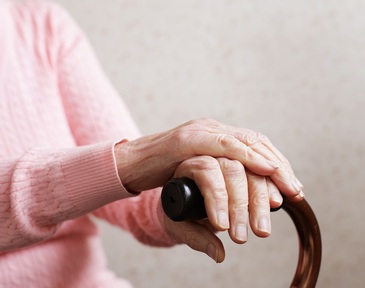Clinically extremely vulnerable advised to stay home as much as possible during England's new lockdown
All clinically extremely vulnerable are to stay at home as much as possible during England's new four-week lockdown starting Thursday 5 November but an extra £32 million will be provided to help support this group.

The clinically extremely vulnerable group includes those with reduced immune systems, for example, due to organ transplants, or those with specific cancers or severe respiratory conditions, such as cystic fibrosis.
Those with chronic kidney disease (stage five) and those undergoing dialysis, as well as adults with Down’s Syndrome, are also being added to the shielding patient list by the NHS.
The majority of people in this group will have received a letter from the NHS or their GP advising them of their inclusion and providing them with further detail on the updated guidance and on how to access the support available.
’I strongly urge all clinically extremely vulnerable to keep safe as possible’
Deputy chief medical officer for England Dr Jenny Harries said: “We have previously said that where the conditions of transmission of the infection alters significantly, we would alert patients in relative regions.
“With the prevalence of the virus continuing to increase across England and in places across the world, it’s right that we adjust our advice for the clinically extremely vulnerable accordingly so they can feel as safe as possible over the coming few weeks.
“Our guidance for this group of individuals has always been advisory, but I would strongly urge all those who are clinically extremely vulnerable to take these extra precautions to keep themselves as safe as possible.”
The updated guidance published today by the government strongly urges clinically extremely vulnerable individuals to:
• Socialising: stay at home as much as possible, except to go outdoors to exercise or attend health appointments. People can exercise with those they live with or in their support bubble.
• Work: If people cannot work from home, they should not attend work. They may be eligible for Statutory Sick Pay, Employment and Support Allowance, Universal Credit or the Coronavirus Job Retention Scheme during this period of national measures. People in the same household who are not clinically extremely vulnerable can still attend work, in line with the new national restrictions.
• School: as evidence has shown there is a very low risk of children becoming very unwell from COVID-19, most children originally on the shielded patient list no longer need to be and therefore can still attend school. If they are unsure, parents should contact their child’s usual GP or hospital clinician to check whether they should still be considered clinically extremely vulnerable. If a GP or clinician has advised that a child should remain on the shielded patient list, they are advised not to attend school. Children who live with someone who is clinically extremely vulnerable, but aren’t themselves, should still attend school.
• Going outside: Avoid all non-essential travel – they should continue to travel to hospital and GP appointments unless told otherwise by their doctor. They are strongly advised not to go to any shops or to pharmacies.
Individuals in this group will also be able to use an online service which will help people to request priority access to supermarket delivery slots and to inform their council they need help. NHS Volunteer Responders can also help with a regular, friendly phone call, and transport to and from medical appointments.
Government to provide over £32 million to upper-tier councils in England
The government will also be providing over £32 million to upper tier councils in England to support the clinically extremely vulnerable over the next month. It will be used to provide support, such as access to food and signposting to local support of befriending services, to the most at risk and enable them to stay at home as much as possible over this short period.
The new national restrictions are set to be reviewed on 2 December.
Latest News
 29-Jul-24
Dementia Bus gives carehome.co.uk staff insight into life with dementia
29-Jul-24
Dementia Bus gives carehome.co.uk staff insight into life with dementia
 27-Jul-23
UK's top home care agencies in 2023 revealed
27-Jul-23
UK's top home care agencies in 2023 revealed
 30-Nov-22
A quarter of older people keep their falls secret from family
30-Nov-22
A quarter of older people keep their falls secret from family
 29-Nov-22
'Covid-19 has not gone away' say terminally ill
29-Nov-22
'Covid-19 has not gone away' say terminally ill
 28-Nov-22
IT consultant who received poor care opens 'compassionate' home care business
28-Nov-22
IT consultant who received poor care opens 'compassionate' home care business